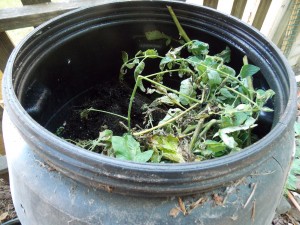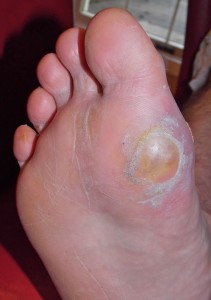 September has arrived and we are seriously looking forward to cooler weather! We decided to shut down the garden a little early in expectation of heavy duty leaf raking. I filled my two compost barrels with the old plant foliage and with the dirt from my container gardens (except the one I am waiting to go to seed). We will be augmenting the barrels throughout the winter with egg shells, coffee grounds, etc. The plan is to use the two barrels of compost to refill the containers in the spring.
September has arrived and we are seriously looking forward to cooler weather! We decided to shut down the garden a little early in expectation of heavy duty leaf raking. I filled my two compost barrels with the old plant foliage and with the dirt from my container gardens (except the one I am waiting to go to seed). We will be augmenting the barrels throughout the winter with egg shells, coffee grounds, etc. The plan is to use the two barrels of compost to refill the containers in the spring.
As mentioned, my ham radio came and, as I thought, it’s complicated! But I am signed up to take my licensing classes next month. I even discovered that my town has a ham radio store!
Last week Trace mentioned the website aGirlandherGun.org. I met “Girl” at a mutual friend’s house where we had gathered to watch a football game. Having never met her before, we were talking and something set my antenna buzzing. I finally looked at her and said, “Are you a prepper?” She is the first local prepper I have met! We had a great evening with lots of discussion about guns and self-protection. If you have not yet had a chance to check out Girl’s website, please do. She is a firearms instructor, and is also taking EMT courses with her husband. You will see that prepping is relatively new to her also, and for a very serious reason. Interestingly, Girl is the second woman fire-arms instructor I know (the other being Pistol Packing Ladies, LLC). So along that train of thought…the husband and I will be taking our gun class next week at the Nation’s Gun Show outside of Washington, D.C. This will allow us to apply for our concealed carry permits. Though neither of us have decided yet if we will carry, we want to at least prepare and get permits.
 Lastly, I have moved fish antibiotics (see Trace’s post Antibiotics In Your Preps?), and books on medications, to the top of our prepper purchase list. This last week the husband “humped” out of the field with a very deep blister in the ball of his foot (If you are not familiar with this phrase, it means Marine Corps camping in which you train and hike 20 or so miles with a 70-80 pound pack, carrying everything you need to eat, sleep, and shoot). He had done everything right: changed his socks regularly, removed his boots to sleep, powdered his feet, etc. But he still managed to get one really deep blister. As a long time Marine and marathoner, my husband teaches others on the importance of foot care. Initially it looked okay, and there were no visible breaks in the skin. Medical opted not to drain the blister because it was so deep, saying he was “good to go” (military slang for fine). But within 36 hours his foot was swollen, red and angry-looking, and he was running a fever. It looked like he had a Fred Flintstone foot that was about ready to split open. We both knew he had a raging case of cellulitis and needed antibiotic treatment. Cellulitis is a bacterial infection which, if left untreated, can lead to a more serious–even life-threatening–type of infections known as sepsis. It can also be resistant to antibiotics, and it is not uncommon to have to take IV antibiotic treatment. In any event, my husband was fine once he started his antibiotics. I personally am allergic to a number of antibiotics, including the one he was treated with, so it is imperative for us to carefully stock the right antibiotics. This was a good reminder of how something as common as a blister can quickly lead to a serious health risk; imagine how you would treat this in a post-collapse situation…
Lastly, I have moved fish antibiotics (see Trace’s post Antibiotics In Your Preps?), and books on medications, to the top of our prepper purchase list. This last week the husband “humped” out of the field with a very deep blister in the ball of his foot (If you are not familiar with this phrase, it means Marine Corps camping in which you train and hike 20 or so miles with a 70-80 pound pack, carrying everything you need to eat, sleep, and shoot). He had done everything right: changed his socks regularly, removed his boots to sleep, powdered his feet, etc. But he still managed to get one really deep blister. As a long time Marine and marathoner, my husband teaches others on the importance of foot care. Initially it looked okay, and there were no visible breaks in the skin. Medical opted not to drain the blister because it was so deep, saying he was “good to go” (military slang for fine). But within 36 hours his foot was swollen, red and angry-looking, and he was running a fever. It looked like he had a Fred Flintstone foot that was about ready to split open. We both knew he had a raging case of cellulitis and needed antibiotic treatment. Cellulitis is a bacterial infection which, if left untreated, can lead to a more serious–even life-threatening–type of infections known as sepsis. It can also be resistant to antibiotics, and it is not uncommon to have to take IV antibiotic treatment. In any event, my husband was fine once he started his antibiotics. I personally am allergic to a number of antibiotics, including the one he was treated with, so it is imperative for us to carefully stock the right antibiotics. This was a good reminder of how something as common as a blister can quickly lead to a serious health risk; imagine how you would treat this in a post-collapse situation…
What’s next on your prepper training schedule?


